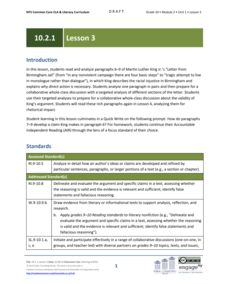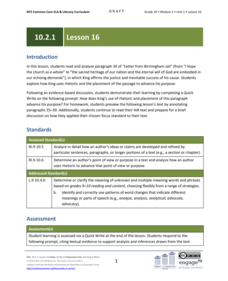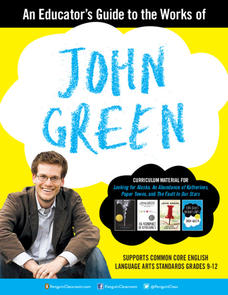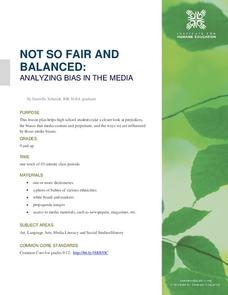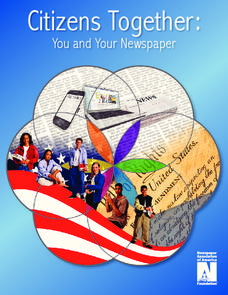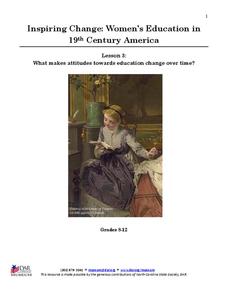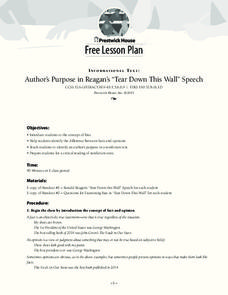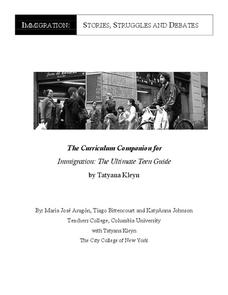EngageNY
Grade 10 ELA Module 2: Unit 1, Lesson 15
Some things are worth doing again. Scholars take a look to see which ideas Martin Luther King Jr. revisits and refines in his "Letter from Birmingham Jail." To help with the process, readers answer guided questions, look at word...
EngageNY
Grade 10 ELA Module 2: Unit 1, Lesson 9
How did Martin Luther King Jr. establish tone in his writing? Scholars analyze King's tone and discuss how he changes and refines his claim in "Letter from Birmingham Jail." They also define new vocabulary words, respond to a writing...
EngageNY
Grade 10 ELA Module 2: Unit 1, Lesson 3
What are the four basic steps of any nonviolent campaign? Readers discover the answer by analyzing a letter written by Martin Luther King Jr. Lesson three involves discussion and analysis of King's claims in paragraphs seven through...
EngageNY
Grade 10 ELA Module 2: Unit 1, Lesson 18
Examine how Martin Luther King Jr.'s final paragraphs of "Letter from Birmingham Jail" summarize the ideas throughout the piece. Readers discuss word usage and new vocabulary and complete guided questions to better understand how the...
EngageNY
Grade 10 ELA Module 2: Unit 1, Lesson 16
Take your place in the world—or the text. Scholars look at how the placement of a particular paragraph adds to the meaning of "Letter from Birmingham Jail" by Martin Luther King Jr. Before working on a quick write activity; readers...
EngageNY
Grade 10 ELA Module 2: Unit 1, Lesson 12
Sticks and stones may break bones, but words matter. Scholars analyze words in paragraphs from Martin Luther King Jr.'s "Letter from Birmingham Jail." They use new vocabulary words and discuss how King's words develop and support his...
EngageNY
Grade 10 ELA Module 2: Unit 1, Lesson 2
Help readers go deeper and gain an understanding of purpose and justification while analyzing a letter written by Martin Luther King, Jr. Literature lovers discuss the letter in a variety of settings, including in pairs, groups, and...
Penguin Books
An Educator’s Guide to the Works of John Green
The novels of John Green cover the gamut of teenager emotions. A guide to his works provides classroom lesson plans for the novels Looking for Alaska, An Abundance of Katherines, The Fault in Our Stars, and Paper Towns. Each lesson plan...
Helena-West Helena School District
I Know Why the Caged Bird Sings Instructional Unit Plan
Maya Angelou's first autobiography, I Know Why the Caged Bird Sings, demonstrates both the author's exemplary writing and the themes of gender and racial injustice that perpetuate beyond the limits of the 20th century. Use a...
Institute for Humane Education
Not So Fair and Balanced: Analyzing Bias in the Media
Life is not always fair. Who's heard that before? This same concept moves to a larger scale using prejudice and bias. Pupils discuss where prejudice attitudes derive and how they develop throughout life. Reading comprehension...
Orlando Shakes
Henry V: Study Guide
Shakespeare did more than write timeless literary works—he coined words such as moonbeam, fortune-teller, and even eyeball! A study guide for Henry V introduces key words the Bard first used with a fun vocabulary activity, part of a...
New York State Education Department
English Language Arts Examination: June 2018
Is graffiti art? Writers explore that question as part of a source-based argument within a set of questions from the NY Regents examination. The assessment from June 2018, part of a larger set of standardized tests, consists of three...
Newspaper Association of America
Citizens Together: You and Your Newspaper
Not all news in a newspaper comes in the form of a traditional article; photographs, charts, and even editorial cartoons help spread important information, too. A civics-based unit describes the parts of the newspaper as tools for...
Social Media Toolbox
Social Media Usage
Is there a difference in the way organizations present news via social media and in print? The third in a series of 16 lessons from The Social Media Toolbox explores news outlets and their delivery methods. Groups follow a story for a...
National Endowment for the Humanities
Lesson 4 James Madison: Internal Improvements Balancing Act—Federal/State and Executive/Legislative
Who has the power? The founding fathers asked the same question when the United States was formed. Learners explore issues that arose during Madison’s presidency that raised constitutional questions. Through discovery, discussion, and...
The New York Times
I Don’t Think So: Writing Effective Counterarguments
When it comes to writing effective arguments, writers must do more than simply make a claim, counterarguments must be considered. Aspiring writers analyze counterarguments in editorials, and then learn how to write counterarguments in...
National Society Daughters of the American Revolution
Lesson 3: What Makes Attitudes Towards Education Change over Time?
The struggle for women's rights is not unique to this generation, or even to the 20th century. Class members explore the conflicting opinions of Alexander Graham Bell and his wife, Mabel Hubbard Bell, regarding women's pursuits of higher...
Daughters of the American Revolution
Lesson 2: How Do We Determine the Value of Education?
Have women always had the same educational opportunities as their male counterparts? Young historians read an 1819 essay by Emma Willard on the state of female education in the 19th century before discussing their views regarding women's...
Daughters of the American Revolution
Lesson 1: How Do Society’s Expectations Influence Education?
The history of women's education can be traced back to the delicate stitching of student samplers from the 19th century. Modern-day pupils examine and analyze four primary sources, three of which are images of embroidered samplers, which...
Prestwick House
Author’s Purpose in Reagan’s “Tear Down This Wall” Speech
President Ronald Reagan's "Tear Down This Wall" speech, delivered on June 12, 1987 before the Berlin Wall, provides class members with an opportunity to examine three key aspects of informational text: author bias, the use of facts and...
EngageNY
Grade 9 ELA Module 4, Unit 1, Lesson 22
Class members read "Satyagraha," the concluding section of Marc Aronson and Marina Budhos' Sugar Changed the World: A Story of Magic, Spice, Slavery, Freedom, and Science, and analyze how the authors support their claim that terrible...
EngageNY
Grade 9 ELA Module 4, Unit 1, Lesson 8
In a close reading of "The Overseer" chapter from Sugar Changed the World, groups focus on the words Aronson and Budhos use to contrast the lifestyles of enslaved people and their enslavers. The whole class then engages in an...
EngageNY
Grade 9 ELA Module 4, Unit 1, Lesson 5
What did the Crusades and plantations do with the global sugar spread? As class members continue their study of Sugar Changed the World, they examine how Crusaders brought sugar to Western Europe and how cultivating sugar led to the...
Curated OER
Immigration: Stories, Struggles and Debates
Considering including Tatyana Kleyn's Immigration: The Ultimate Teen Guide as part of your course? Check out this curriculum guide designed for use with her book. The activities help learners understand the complexity of the...




